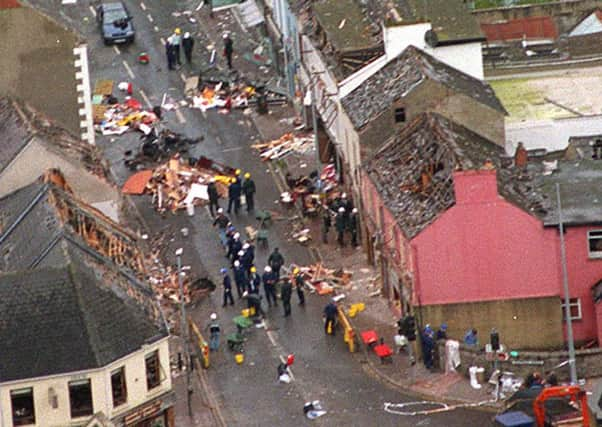PSNI chief slams claim police could have stopped Omagh bomb


George Hamilton said that Nuala O’Loan was making a “bizarre” claim, two decades after the fact, and was based on “no new information”.
Ex-policing watchdog Baroness O’Loan called for a public inquiry into the worst single atrocity of the Northern Ireland conflict and seriously questioned the handling of security force intelligence.
Advertisement
Hide AdAdvertisement
Hide Ad“I find it bizarre that 20 years on when our thoughts should be with the families, and trying to support them, that assertions like this – based on no new information – are being brought into the public debate.
“Today should be one [of] sympathy and empathy with those families, not about traumatising them further by telling them that this could have been prevented.
“I don’t believe it could’ve been.
“What I’m saying is that we’ve got 29 people dead and two unborn twins.
“It’s the 20th anniversary of that. If I was a close relative of those, or even as a police officer, as a human being, to think that the police were sitting on information that could’ve prevented that, I think that is traumatising for anybody.”
Advertisement
Hide AdAdvertisement
Hide AdHe said the issue had already been examined “ad infinitum” in the past, including by Baroness O’Loan herself.
Today, relatives will mark 20 years since the August 1998 dissident republican blast which killed 29, including a woman pregnant with twins.
Baroness O’Loan said: “My view now is that it could have been prevented.”
She said the various intelligence services could have worked in a more cohesive way.
Advertisement
Hide AdAdvertisement
Hide AdOn August 4 1998, 11 days before the bombing, the Royal Ulster Constabulary (RUC) received an anonymous telephone call warning that there would be an “unspecified” terrorist attack on police in Omagh on August 15 1998.
The force’s Special Branch, which handled intelligence from agents, took only limited action on the information and a threat warning was not sent to the sub-divisional commander in Omagh, an investigation by Baroness O’Loan when she was police ombudsman found.
A RUC review concluded in 2000 that the information should have been passed to the commander.
Baroness O’Loan told the BBC: “If that had been conveyed to the sub-divisional commander in Omagh he could have just set checkpoints up around the town and the effect of that could have been to drive the bombers to abandon their bomb.”
Advertisement
Hide AdAdvertisement
Hide AdShe said the intelligence services were tracking the movements of the car containing the bomb from the Republic of Ireland.
“What we do need now is an inquiry, a full public inquiry to find out why this happened and how it could have been prevented.
“I am not yet convinced that the way in which we handle intelligence across the UK is adequate to secure maximum information.”
The massive car bomb ripped through the Co Tyrone town just months after the 1998 Good Friday peace agreement was supposed to have largely ended violence.
Advertisement
Hide AdAdvertisement
Hide AdA splinter dissident republican group opposed to the peace process, the Real IRA, was blamed for the carnage after inaccurate warnings meant police evacuated shoppers towards the bomb site.
Twenty years later, nobody has been convicted of murder and relatives of the dead will gather on the spot on Wednesday afternoon for a short ceremony led by the Omagh Churches Forum.
It will be followed by the ringing of a bell 32 times to reflect the 31 lives lost and an additional peal to remember all who have lost their lives through similar atrocities.
The victims included Protestants and Catholics, tourists from Spain and others on a day trip from the nearby Republic of Ireland.
Advertisement
Hide AdAdvertisement
Hide AdOne of the biggest police manhunts in history unfolded, but criticism of the police investigation led to unfulfilled calls for a public inquiry.
Two people faced prosecution for murder but were not convicted.
Twenty years on, the Stormont power-sharing administration, which was a centrepiece of the Belfast Agreement, is suspended with little sign of its restoration.
Dissident republicans continue to pose a serious threat to life, primarily to members of the security forces.
Advertisement
Hide AdAdvertisement
Hide AdWednesday’s commemoration will begin at 2.55pm at the site of the bombing in Market Street.
The bell will stop tolling at 3.10pm, the time the bomb exploded.
The ceremony will feature a song, and then people will be offered a flower petal to scatter into a river or a pond at a nearby memorial garden.